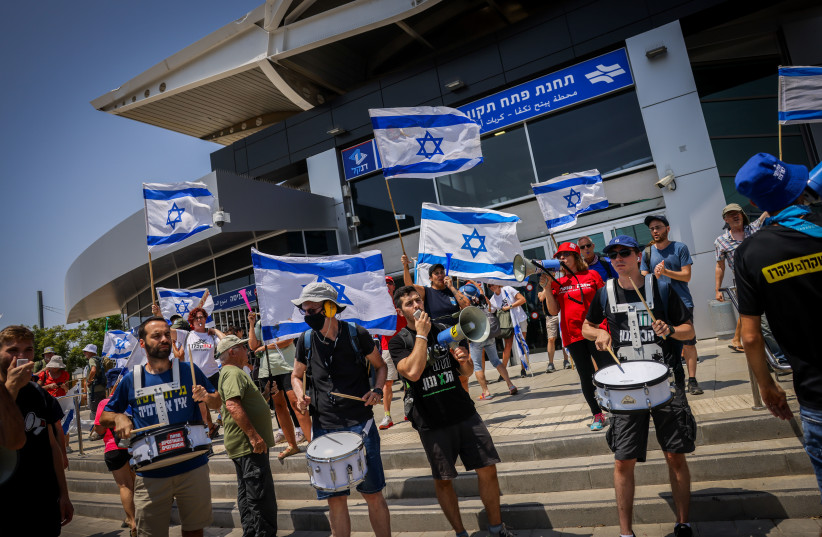Protesters gathered on Thursday as Tel Aviv’s long-awaited Light Rail opened with a ceremony attended by Prime Minister Benjamin Netanyahu, Transportation Minister Miri Regev, Finance Minister Bezalel Smotrich, and Energy Minister Israel Katz, a former transportation minister.
Netanyahu spoke in a hopeful tone at the event, saying that “Those who support us and those who oppose us – everyone will use this train. This is a holiday for Israel. Today we are fulfilling Israel’s transportation vision – we promised and we are delivering. We promised to connect the cities, within the cities and between the countries – and we are doing all three things.”
The public transportation project broke ground in 2011 – though it was originally proposed 50 years ago by then-prime minister Golda Meir – and it was most recently promised that it would begin operating by the end of 2022. The project continued to see multiple delays – partly due to a malfunction in the brake system – which has led to Tel Avivians watching empty trains go by for months.
Public services on Shabbat
That’s all changing, as the train begins service on Friday on its 34-stop route from Bat Yam to Petah Tikva through Jaffa and Tel Aviv’s Rothschild Boulevard. City planners hope the new train will ease congestion and improve the lives of residents.

Protesters are demonstrating against the decision by the government to close the rail a few hours after it begins service in honor of Shabbat. The light rail will not run on the day of rest and on holidays.
This move was decried by secular activists, including Tel Aviv Mayor Ron Huldai, who announced he will not be attending the event. He said Thursday that “As someone who supports and promotes transportation on Shabbat, I have been saying for a long time – the light rail must operate and serve the public even on Shabbat.
"That's how it should be in a liberal and democratic country.”
He will, however, take part in the train’s maiden voyage.
"The opening of the light rail is a historic and important event, an event that I have waited 23 years for this to happen,” Huldai added.
One of the main reasons given for not operating the Red Line on Shabbat, is that it runs through Bnei Brak, one of the country’s most densely populated haredi (ultra-Orthodox) communities. Given the makeup of the government, it was next to impossible this would pass.
Police set up roadblocks around the city in anticipation of the prime minister’s arrival to the White City, where more than 100,000 of its residents have been protesting weekly against his government over judicial reform for the past seven months.

The Kaplan Force, one of the main drivers of the protest movement, announced last week it would be protesting the opening, even threatening to sit in on train routes to prevent its passage. They sent a note to Police Commissioner Kobi Shabtai asking that he stop the “paralysis in Tel Aviv for the dictator’s light rail journey.
“The police put citizens under siege and paralyze an entire city so that the dictator does not encounter the protesters. This is what a dictatorship looks like.”
Regev said at the event that “This is a historic day, and how symbolic that today we inaugurate a line whose essence is ‘connection.’ Precisely in days of division and extremism, the new line teaches us to connect and bridge differences - Between the residents of Bnei Brak and Tel Aviv,
The rail’s remaining lines will open over the next few years.
